Farm Bureau’s Rural Route connects farmers in more ways than one
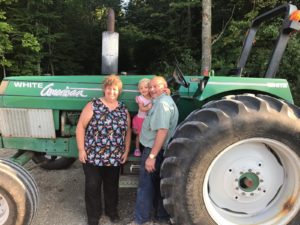
In 2012, Outagamie County Farm Bureau member Rick DeRuyter was diagnosed with Idiopathic Pulmonary Fibrosis. He was put on oxygen, which he eventually needed full-time, using up to 45 tanks each week. He also had two oxygen concentrators, which make oxygen from atmospheric air.
Idiopathic Pulmonary Fibrosis or IPF is a disease that causes tissue deep within the lung to stiffen and scar over time. In cases where the cause is unknown it is recognized as idiopathic.
“Prior to the diagnosis, I was having chest pain and shortness of breath,” said Rick who farms near Seymour. “I couldn’t even sweep the kitchen floor without having to sit down. I thought it was my heart.”
Rick’s wife Sherry said that often times IPF is misdiagnosed because the symptoms seem to be cardiac related.
“Sometimes IPF can be misdiagnosed as asthma, chronic obstructive pulmonary disease or congestive heart failure,” added Sherry.
The only cure for IPF is a lung transplant, so after being diagnosed and as the disease progressed, Rick realized that he had to make some changes. He started working out at the Green Bay YMCA.
“I wasn’t so sure about the surgery but I knew I needed to lose some weight,” said Rick. “I also wanted to make sure I was healthy enough for a life-saving lung transplant surgery and healthy enough to recover from surgery.”
Initially, Rick worked on the NuStep machine, treadmill, and he also used some weights.
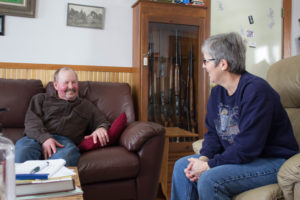
In 2016, Rick and Sherry received the April/May 2016 Rural Route and Rick read the article about Jackson County Farm Bureau members Steve and Pat Kling. Steve had a life-saving lung transplant in 2015 after he had been diagnosed with IPF. Steve also serves as Jackson County Farm Bureau president.
“I had trouble breathing for nearly six years,” said Steve, who owns a farm near Taylor. “It was originally identified as farmer’s lung, which is caused by exposure to dust inhalation resulting in lung inflammation.”
Rick said that Steve encouraged him to have the lung transplant and told him that if he had to do it all over again, he would.
“When I called and talked to Steve, we hit it off just like we had known each other all of our lives,” said Rick. “Steve and his wife Pat had similar interests, for example, they enjoy playing cards and we had traveled to Alaska with mutual friends John and Mary Schaumberg who also live in Seymour (Steve and John attended UW-River Falls together), and we were Farm Bureau members.”
Steve was added to the transplant list on December 23 and three days later, had his life-saving lung transplant surgery on December 26, 2015. Steve and his family arrived at UW Hospital in Madison at 7:30 a.m. and by 7:30 p.m. he was out of surgery and awake.
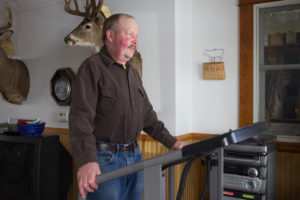
“It really felt like a dream,” said Steve. “During the surgery, I was on a breathing machine and once they took out the tube, I was breathing on my own. I didn’t need oxygen anymore.”
Kling spent nine days in the hospital and another eight in a nearby hotel.
“During this time, I connected with other transplant recipients and those who were on the waiting list,” added Steve. “This was an eye-opening experience and probably one of the reasons that when Rick called, I was able to share my experience as well as others’ experiences.”
Steve’s wife Pat recommends viewing ‘The Gift,’ a documentary about retired Navy Captain Wayne Bergeron who traveled from his home in Massachusetts to Madison, in hopes of prolonging his life (www.youtube.com/watch?v=m6qvXboqXTY).
“Bergeron needed a lung transplant, and the Veteran’s Hospital, partnering with UW Hospital and Clinics, is the only facility in the country that does this for Veterans,” added Pat.
Thinking back, Steve said that it was, “quite a coordinated effort to get everything in place, and have it go so well.” Even though his body accepted the new organ, there were many checkups and follow-up appointments.
“I have to thank Dr. Jim Maloney and his team at UW Hospital and the support of my family, our friends and community,” said Steve. “And just as importantly, I’m thankful for the donor’s family and their incredible generosity. Without this donation, none of this would have taken place and prolonged my life to enjoy with family and friends. I hope anyone who reads this will consider organ donation. Let family members know your wishes. Put the orange donor dot on your drivers’ license or sign up online at donatelifewisconsin.org.”
After talking to Steve, Rick was even more determined and continued his workouts at the YMCA. Eventually, however, his symptoms continued to get worse and it became difficult for him to leave their home.
“Rick had to go in for pulmonary function breathing tests every three to six months,” said Sherry. “These tests showed that his breathing was getting worse and his oxygen levels were dropping.”
In January of 2018, Rick had another setback.
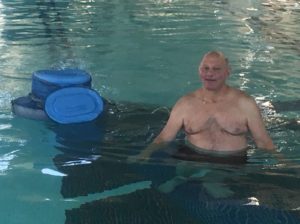
“Our son took me to the emergency room with a 103.4-degree fever,” explained Rick. “I was put on a breathing machine and they packed me on ice to get my fever down. A few days later I felt better but I struggled to breath. I was airlifted to UW Hospital in Madison, where the doctors gave me one to three months to live. I honestly didn’t think I would get home. The doctors told me I was no longer a candidate for a lung transplant because of the acute exacerbation.”
Rick did go home and he was more determined than ever to get healthier. He went to the YMCA three times a week where his personal trainer Cassandra Moeller helped him workout in the pool since it would be easier on his body.
“It wasn’t easy to workout in the pool,” said Rick. “I’d have to have four oxygen tanks and 70 feet of tubing in order to use the pool and keep 30 liters of oxygen going. I also exercised at home. Thirty minutes on the treadmill, 30 minutes of the elliptical and 60 sit ups every day.”
After seeing how hard Rick was working, Sherry and their four children convinced the doctors to let him come back to Madison to see if he could get on the transplant waiting list.
On February 7, the family received the good news that Rick was placed on the waiting list.
“I continued to workout at the YMCA and at home,” said Rick.
Then on September 25, Sherry received a call with the news that they had been hoping for.
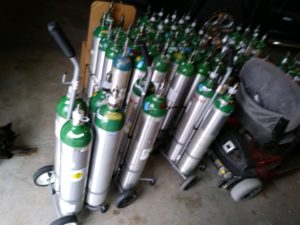
“I was out in the garden pulling weeds with 30 liters of oxygen,” said Rick. “Sherry came home and said we had to go to Madison. I said that I had to finish pulling the weeds, and she said no, we had to go.”
On September 26, Rick had his left lung replaced. He was in the hospital for 17 days and then he stayed in the Madison area for another 17 days in case anything happened.
“I immediately noticed a difference,” said Rick.
Four days after his life-saving surgery, Rick and Sherry had visitors. Steve and Pat drove to Madison and surprised them. Since Rick’s surgery, the couples talk on the phone and are planning to meet for a show at the Crystal Grand Music Theatre in Wisconsin Dells.
Five months after the surgery, Rick and Sherry frequently travel back and forth from Seymour to UW Hospital in Madison for check-ups.
“Without someone donating a lung, Rick would still be on oxygen and not on the road to recovery,” said Sherry and added that there are many people in the area who are transplant recipients. “It is so important for people to be organ donors.”
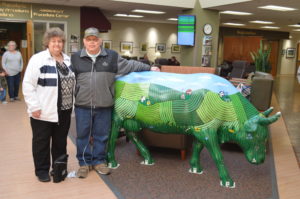
According to the UW-Health lung transplant data: In July 2017, there were 22 people on the waiting list; by the end of June 2018, 17 people remained on the waiting list; 26 people have received transplants; and 89.8 percent of the patients are alive with a functioning transplant at the one-year mark.
On November 4, Rick received an Inspiration Award from the Green Bay YMCA for his work and dedication to becoming healthy.
“The doctors said if it wasn’t for the work at the YMCA, I wouldn’t have been strong enough for the lung transplant,” said Rick. “Thank you to everyone for your support including members of our church, neighbors, friends and family and fellow Farm Bureau members.”
To learn more about organ donation, to see if you are registered as an organ donor or to register as an organ donor, visit Donate Life Wisconsin.
Written by Marian Viney, communications specialist with Wisconsin Farm Bureau Federation.


Leave a Reply